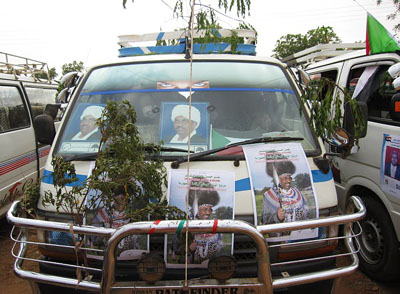
Arrests and intimidation of civil society leaders in both North and South Sudan last week underscored the continued stifling of opposition and civil society groups during the country’s crucial campaigning stage, with a little over a month left before elections.
Southern security personnel raided two radio stations in Juba on Wednesday, threatening and arresting the general manager of Liberty FM and director of Bakhita, a Catholic radio station. According to a Reuters interview, the armed men who entered the premises of Liberty FM said they were South Sudanese police. One station manager who was taken to a police station was told: “You are producing bad programs that bring hatred of the people.” The station manager said Liberty FM had aired an interview with an independent candidate running for the governor seat in Central Equatoria state.
The raid on Bakhita Radio led to a strongly-worded response from the Catholic Archdiocese of Juba which condemned the act: “The Catholic Church and Bakhita Radio have no political affiliation and take no sides with any political party. We will not accept church personnel and institutions to be treated as criminals.”
The Association for Media Development in South Sudan says the harassment is indicative of a structural problem in the South’s campaign environment—the lack of media laws in place. The press release said:
As we speak, the draft South Sudan Media Laws are still sitting in the Southern Sudan Assembly awaiting enactment. Meanwhile, we conduct elections campaigns in an environment where the media is still playing a game of football without clear rules, a Russian Roulette game where journalists have no idea which opinion expressed contains the next bullet, worse still for not knowing from whom in particular the whistle is coming.
Similar practices are taking place in the North, where new rules recently published by the elections commission have created a highly restrictive environment for campaigning by opposition parties. One new rule requires parties to give 72 hours notice for rallies held even within party premises.
On Thursday, security forces broke up a voter education campaign in Khartoum held by civil society group Girifna. According to the Africa Center for Justice and Peace Studies, three members of the organization were arrested and charged for “public noisiness.” The day before, Sudanese state radio blocked Umma party presidential candidate Al-Sadiq Al-Mahdi from airing his 20-minute radio broadcast because of points in his speech that were seen as “inciting prejudices and hatred against the state,” including a reference to incumbent president Omar al-Bashir’s ICC arrest warrant.
With so many instances of political oppression, it’s hard to be optimistic about the prospect for free and fair elections in Sudan. One clear first step is for government to enact equitable electoral legislation that will help create an environment in which opposition politics can survive. In the final weeks before polling begins, U.S. and E.U. monitors must also ensure that they are not simply assessing the elections themselves, but evaluating whether the larger human and political rights context is in place for elections to even have a chance.

